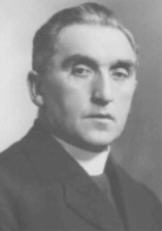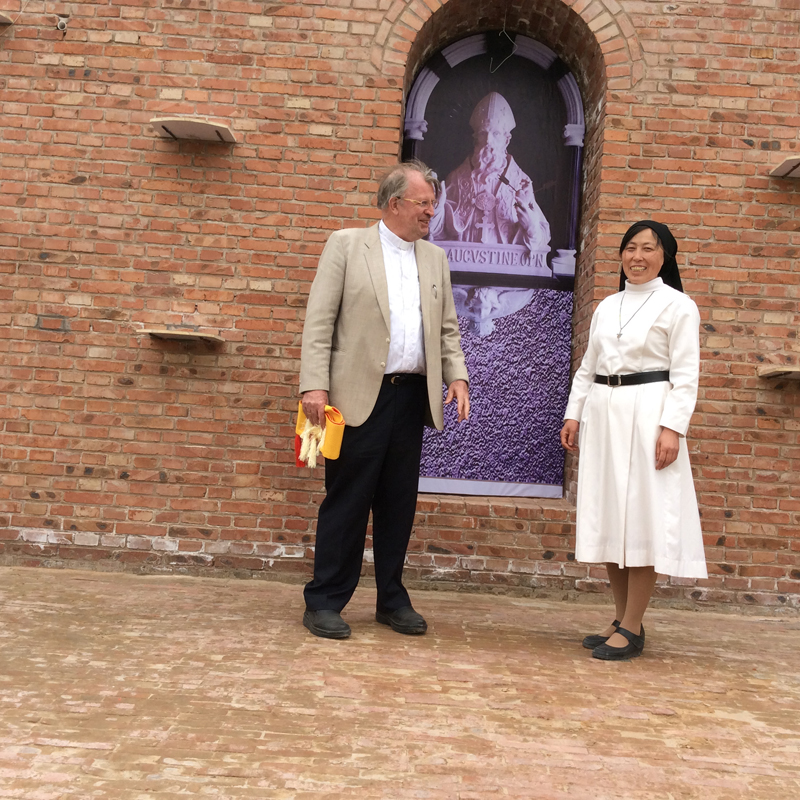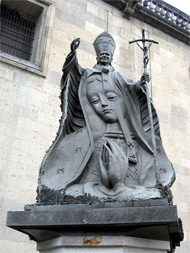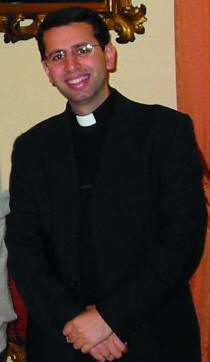Misyon Online - July-August 2014
Pulong ng Editor
Being at home
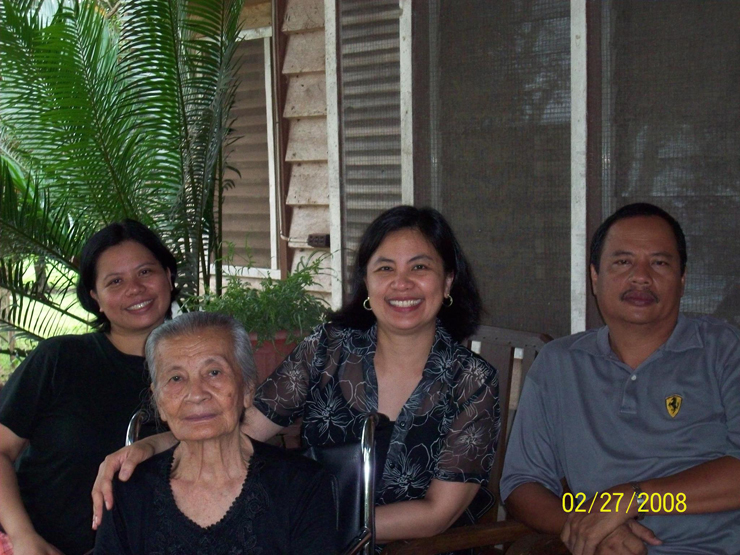
Beth Sabado, left, with her sister Gondee, brother
Felix and their mother, Pacita.
Beth Sabado, Coordinator of the Lay Missionary Central Leadership Team (LMCLT) of the Columbans, writes in Where is Home? in this issue of the question that faced her as the plane in which she flew from Hong Kong to Manila in February 2013 was about to land: ‘Where is home for me now?’ She was on her way to attend the funeral of her mother, Pacita Egipto Sabado. Her father, Telesforo, had predeceased Pacita.
Read story...


Peace by Peace
Not easily shall one reach this height; it is no child’s play, nor the work of a day to turn with a decisive gesture from the allurements of life. It costs blood to stand the strain and overcome the repugnance of nature. When we bend our minds to this prayer and say it earnestly, we seem to hate ourselves and in the eyes of worldly men to act foolishly and give an opening for the charge of folly. ‘Unto the Gentiles folly’, utter folly to neglect the passing joy, to allow the flower of the time to pass by us. Yet looking on Christ we shall willingly accept such opprobrium. So sure are we of the goodness of the heart of God that we can wish for nothing better nor plan for anything more secure than what his Divine Heart wills, for never is a man so utterly right, so sure of blessings, as when he says this prayer – ‘Our father . . .thy will be done . . .’ -Pathways to God, Fr John Henaghan, MSSC |
Read story...

Keeping Father Niall’s legacy alive: After 10 years, now and beyond
By Richelle Verdeprado
The author is Editorial Assistant of Misyon
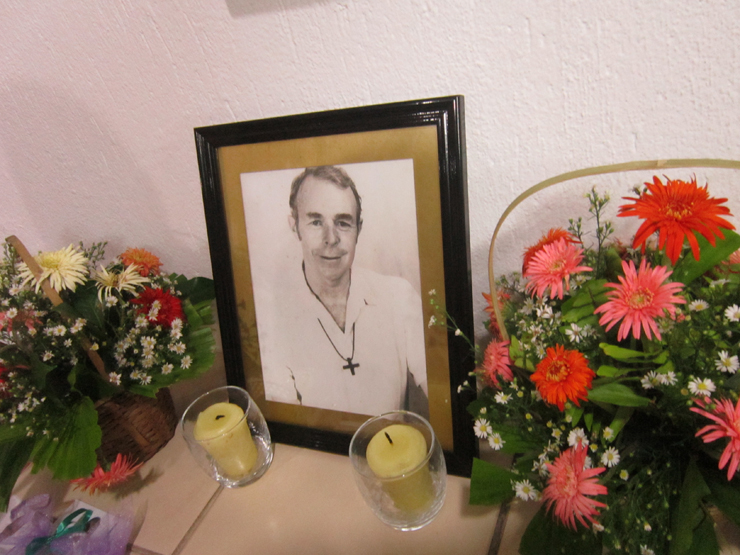 We are not immortal beings. In as much as we would want to do amazing things unceasingly and never leave the people that we love, we cannot live forever. Perhaps this is how it really goes in our human lives. We will have years of celebrating our birthdays until one day others will be starting to commemorate our death anniversaries instead. While still breathing we can have moments of learning, enjoyment and discovering until one day we can no longer do them again.
We are not immortal beings. In as much as we would want to do amazing things unceasingly and never leave the people that we love, we cannot live forever. Perhaps this is how it really goes in our human lives. We will have years of celebrating our birthdays until one day others will be starting to commemorate our death anniversaries instead. While still breathing we can have moments of learning, enjoyment and discovering until one day we can no longer do them again.
But I think too, it is that same mortality that can make our lives even more precious. It is that same mortality that will give us enough time to bring joy and hope, to make choices and changes that can go beyond our own lives and have an impact on one individual or even on the entire community and the world. Likewise, it is that same mortality that can cause some people meet each other while others never get that chance. There is a time element in life.
The Kibbutz on Tall Grass Mountain, which shows one of the major initiatives of Fr Niall O'Brien, was produced by the Columbans in the USA in the 1970s, during Martial Law in the Philippines.
Read story...

His Children’s Hero
By Richelle H. Verdeprado
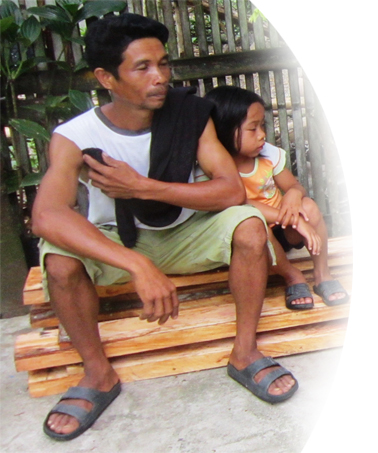 The journey from the hinterlands of barangay Sanke, Hinoba-an, Negros Occidental, to the village proper by the sea, was like a Sunday get-together for the Layan family. Tatay Hermenio was with five of his five children, his wife, pregnant with their seventh child staying at home.
Our Kwaderno team was set to have notebook distribution at 9 am that 25th day of May but Tatay Hermenio was already there before 7am. To get there, the Layans had to pass by several mountains, cross a river and then walk about an hour.
The journey from the hinterlands of barangay Sanke, Hinoba-an, Negros Occidental, to the village proper by the sea, was like a Sunday get-together for the Layan family. Tatay Hermenio was with five of his five children, his wife, pregnant with their seventh child staying at home.
Our Kwaderno team was set to have notebook distribution at 9 am that 25th day of May but Tatay Hermenio was already there before 7am. To get there, the Layans had to pass by several mountains, cross a river and then walk about an hour.
It wasn’t just for the notebooks that his children would be receiving that day. Tatay Hermenio had a deeper purpose, I could sense it in his eyes. I could see that for the education of his children, he would do anything.
The family of Sanke’s barangay captain served breakfast to the Layan Family, knowing that they had had a long and difficult journey. Eleven-year-old Chona, the eldest among them was interviewed by Irene, one of our volunteers. Chona was shy but she responded to the questions politely. There was a certain glow in her eyes when she shared that her happiest moment was when she received a service award in their school this last year. In Junethis year started in Grade Five. She was excited to start the school year as she has recognized that there are so many things to be learned in school.
Read story...

What Comes After Dusk
By Anne Gubuan
The author, assistant editor of Misyon, writes about Kwaderno , a project that the editorial staff of the magazine and friends of theirs initiated to buy school notebooks for children in impoverished areas. ‘Kwaderno’ is a Filipinized form of ‘cuaderno’, a Spanish word for ‘notebook’. The project was inspired to some degree by the involvement of some of the group with a school that was devastated last November by Super-typhoon Haiyan/Yolanda. You can read more about that in Misyon in the May-June issue, In the Midst of a Storm.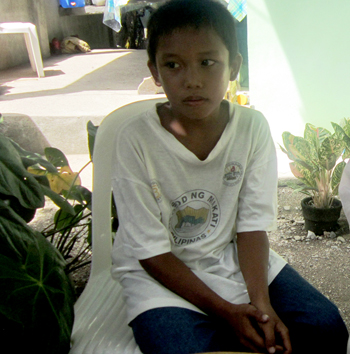
Marvin is 11 years old, but looks like he is only eight. His hands are riddled with bruises and marks which tell of his long days under the heat of the sun, toiling on the farm. He was wearing an old, almost worn-out, shirt and oversized pants that nearly reached his ankles. As soon as I asked him my first question, he hung his head and tears fell on his knotted fingers. It wasn’t easy to go ahead with my carefully lined up questions. They got all jumbled up inside my head, as I struggled not to cry with this little man, who needed all the encouragement he could get. Yes, ‘little man’, for all the burdens that his small frame carries, for the heart he has, brave and courageous amidst all the hardships, pains and uncertainties in life that he has to face each day.
‘Where do you live?’ I asked,careful not to intimidate him. ‘I live with my grandfather’, he answered meekly, still looking down, trying to stifle his tears. ‘You don’t live with your parents?’
Read story...

Where is Home?
By Beth Sabado
The author, from Pagadian City, Zamboanga del Sur, Philippines, is a nurse by profession and has worked as a Columban Lay Missionary in Taiwan. She is currently based in Hong Kong as Coordinator of the Lay Missionary Central Leadership Team (LMCLT).
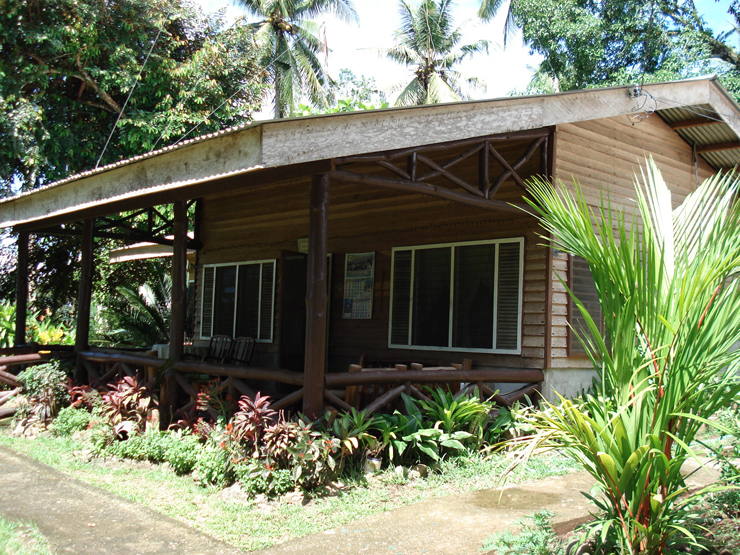 I had the chance to watch a stage play in Birmingham Repertory Theatre entitled ‘Refugee Boy’. A story about a fourteen-year-old boy born of an Ethiopian father and Eritrean mother and because of a violent civil war back home his father made a heartbreaking decision to leave him in London.The boy woke up one morning and his father was gone. As described, ‘Refugee Boy’ is a story about arriving, belonging and finding a home.
I had the chance to watch a stage play in Birmingham Repertory Theatre entitled ‘Refugee Boy’. A story about a fourteen-year-old boy born of an Ethiopian father and Eritrean mother and because of a violent civil war back home his father made a heartbreaking decision to leave him in London.The boy woke up one morning and his father was gone. As described, ‘Refugee Boy’ is a story about arriving, belonging and finding a home.
‘A home is a place where I can unpack my luggage down to the very bottom’. This is how one of the refugees in the playdefined a home. Her definition stayed with me from then on.
Read story...

Learning ‘Poco a Poco’ in Honduras
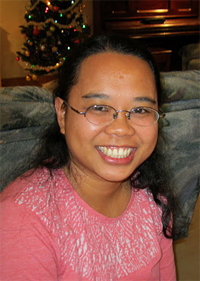
By Mary Ann Ofialda
The author, from Iloilo City, is working as a lay missionary in Honduras with the PME Fathers. She worked as a Columban Lay Missionary from August 2003 to April 2006 in Taiwan. In July 2012 she was assigned to Tegucigalpa, the capital of Honduras. Currently, she is workingas a volunteer ata home for the aged, Hogar de Ancianos Maria Eugenia, and in Casa Ángeles, a home for abandoned/orphaned children with severe physical and mental disabilities, and the mission animation project, Ad Gentes. Mary Ann worked in Taiwan as a Columban Lay Missionary from August 2003 to April 2006.
 ‘One doesn't discover new lands without consenting to lose sight, for a very long time, of the shore.’– André Gide.
‘One doesn't discover new lands without consenting to lose sight, for a very long time, of the shore.’– André Gide.
In 2011, when I was accepted into the second level formation in Davao del Sur of the Société des Missions-Étrangères or the Foreign Mission Society of Quebec, known in the Philippines as the PME Fathers, I felt that I had taken a very significant step, venturing out to a unique kind of calling. It was a decision that took a lot of personal discernment, reflection, gradual detachment from my comfort zones as well as support and counsel from my family and close friends. My four months' experience during formation among the B’laan people in the mountains of Little Baguio, Davao del Sur, was a memorable story in itself.
Read story...

Opening of First Contemplative Monastery in China since 1949
The following press release was published in May and has been slightly edited. Columban Fr Eamonn O’Brien, Director of Cultural Exchange with China (CEC) is from Ireland and spent his early years as a priest in the Philippines.
 On 1 May the feast of St Joseph the Worker,the monastery of St Augustine was opened in Lintou, in the Shan Xi Province of China. This is the first contemplative monastery to be opened in China since1949.The monastery and associated nursing home will be known as St Augustine's Garden.
On 1 May the feast of St Joseph the Worker,the monastery of St Augustine was opened in Lintou, in the Shan Xi Province of China. This is the first contemplative monastery to be opened in China since1949.The monastery and associated nursing home will be known as St Augustine's Garden.
St Augustine's Garden was opened by Bishop Paul Meng (Diocese of Taiyuan). The opening Mass was concelebrated by Bishop Wu Jin Wei (Diocese of Yun Cheng) and approximately 50 priests, with over 1,700 Catholic lay faithful in attendance. The two-hour Chinese Mass was full of joy and thanksgiving.The monastery chapel was opened and consecrated by Bishop Wu Jin Wei the previous evening.
Read story...

Our Hideaway
Passion Is The Key
by Stephen Virtudazo Tabal
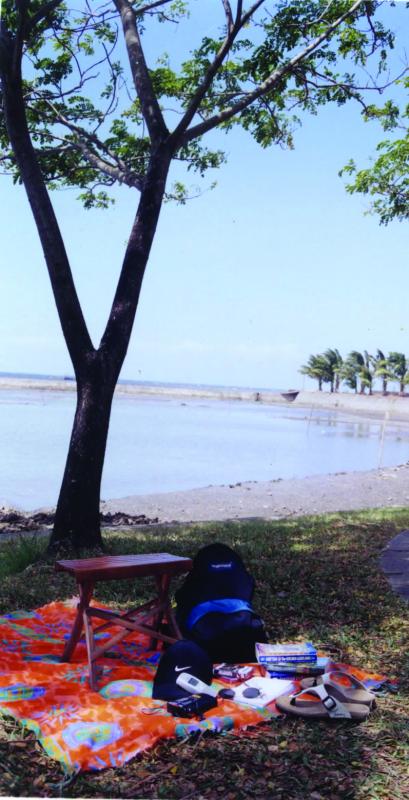
Our Hideaway is a
venue for the youth to express themselves and
to share with our readers their mind, their heart and their soul.
The author teaches physics in Lanao del Norte National Comprehensive High School (LNNCHS), Baroy, Lanao del Norte.
‘Teaching is not a profession but a passion’, it has been said. I didn’t realize this until I was employed in a public high school. It is totally different from the schools where I used to teach. It seems like I’m in a parallel universe and I feel that I need a lot of adjustment to before I can teach well.
 One day I assigned my students to bring candles for our optics activity in physics. Fortunately it went well and the students enjoyed it much. After the activity, a student named John (not his real name) approached me and said, ‘Sir, may I have the candles used in our activity?’ I paused for a while and asked, ‘Why?’ With head bowed down he answered, ‘I will use them to light our house so that I can work on my assignments’. I couldn’t believe what I had just heard. Up till then almost every person I met on the street had a smartphone and tablet. But there are still areas in our country left in the dark not because of blackouts but because of extreme poverty.
One day I assigned my students to bring candles for our optics activity in physics. Fortunately it went well and the students enjoyed it much. After the activity, a student named John (not his real name) approached me and said, ‘Sir, may I have the candles used in our activity?’ I paused for a while and asked, ‘Why?’ With head bowed down he answered, ‘I will use them to light our house so that I can work on my assignments’. I couldn’t believe what I had just heard. Up till then almost every person I met on the street had a smartphone and tablet. But there are still areas in our country left in the dark not because of blackouts but because of extreme poverty.
After a week the rainy season came and many of my students were absent. John came in five minutes late and wasn’t wearing his uniform so I approached him and he said, ‘Sorry, Sir. I had to remove my uniform because I was soaked but I can still put it back on. It’s in my bag. I wrapped it in cellophane.’
Read story...

Pulong ng Editor
Being at home

The Sabado Family home, Pagadian City, Zamboangadel Sur.
Beth Sabado, Coordinator of the Lay Missionary Central Leadership Team (LMCLT) of the Columbans, writes in Where is Home? in this issue of the question that faced her as the plane in which she flew from Hong Kong to Manila in February 2013 was about to land: ‘Where is home for me now?’ She was on her way to attend the funeral of her mother, Pacita Egipto Sabado. Her father, Telesforo, had predeceased Pacita.
Beth shares how she was moved by a play she saw in Birmingham, England, where some Columban lay missionaries are based, called Refugee Boy. One of the characters in the play defines home as ‘a place where I can unpack my luggage down to the very bottom’. Some are blessed by God with the ability to do that wherever they find themselves, even for a few days.
In the mid-1980s Bishop Bienvenido S. Tudtud of Marawi visited my widowed father in his home in Dublin. Later my father said to my brother, ‘The Bishop made me feel at home’. My brother, laughing, said to Dad, ‘You were the one supposed to make him feel at home!’ My Dad, a very simple person who wasn’t used to meeting bishops, was a person ‘at home with himself’, as was Bishop Tudtud. They made each other feel at ease. Both died not too long after that, Bishop Tudtud in a plane crash near Baguio on 26 June 1987 and my father, suddenly, on 11 August that year.
My experience is that a person who is at home with his or her self can truly make another feel the same way, especially a person in distress. I have seen this in Holy Family Home for Girls in Bacolod City where a new girl, sometimes full of anger because of what has happened to her, often having been betrayed in the most brutal way in her own family, is welcomed by other girls who have been through similar situations. I have seen teenage girls there, without being asked by the Sisters or social workers in charge, staying every moment with a new girl every for two or three days until she realizes that she can be at home there and lets go of her anger and anxieties.
A few days ago I read the extraordinary story of Hieu Van Le who will become Governor of South Australia in September, a ceremonial position in which he will represent Queen Elizabeth of Australia who resides in England, where she is also queen. He arrived in Australia as a refugee from war-torn Vietnam in 1977. In the video below he tells, very movingly, how when they arrived at Darwin, having been at sea for a month in a boat never intended for such a journey, two casually-dressed Australian men waved at them, one of them raising his glass of beer and saying, ‘G’day, mate. Welcome to Australia!’ That simple greeting had a profound impact on the refugees.
Hieu Van Le quickly settled into life in Australia where his two children were born. He and his wife Lan felt so much at home that they named their sons after two famous Australian cricketers. Cricket, a sport that is a passion with many Australians, is totally unknown in Vietnam. But while becoming Australian, he and Lan didn’t have to cease being Vietnamese.
The experience of Hieu Van Le mirrors that of many missionaries. They have to adapt to new ways, often very different to what they have been used to. Yet their hosts don’t expect them to cease being who they are. At times they see themselves as having two homelands, at times as having none. At times they may keenly miss their country of origin. At times when visiting that country they may keenly miss their adopted country.
When Hieu Van Le and his companions arrived in Australia they didn’t have much luggage to unpack. But by the welcome they received from the two men on the quayside, and later from ‘official Australia’, they felt that they could unpack the little that they had ‘down to the very bottom’.
For us Christians the ultimate reason for feeling at home no matter where we find ourselves is that ‘the Word became flesh and lived among us’ (John 1:14). The scholars tell us that the original means he ‘pitched his tent among us,’ that Jesus Christ, God who became Man, threw in his lot with us. And more than that: at the Last Supper Jesus said, ‘Those who love me will keep my word, and my Father will love them, and we will come to them and make our home with them (John 14:23).
His Children’s Hero
By Richelle H. Verdeprado
 The journey from the hinterlands of barangay Sanke, Hinoba-an, Negros Occidental, to the village proper by the sea, was like a Sunday get-together for the Layan family. Tatay Hermenio was with five children, his wife, pregnant with their eight child staying at home.
Our
Kwaderno team was set to have notebook distribution at 9 am that 25th day of May but Tatay Hermenio was already there before 7am. To get there, the Layans had to pass by several mountains, cross a river and then walk about an hour.
The journey from the hinterlands of barangay Sanke, Hinoba-an, Negros Occidental, to the village proper by the sea, was like a Sunday get-together for the Layan family. Tatay Hermenio was with five children, his wife, pregnant with their eight child staying at home.
Our
Kwaderno team was set to have notebook distribution at 9 am that 25th day of May but Tatay Hermenio was already there before 7am. To get there, the Layans had to pass by several mountains, cross a river and then walk about an hour.
It wasn’t just for the notebooks that his children would be receiving that day. Tatay Hermenio had a deeper purpose, I could sense it in his eyes. I could see that for the education of his children, he would do anything.
The family of Sanke’s barangay captain served breakfast to the Layan Family, knowing that they had had a long and difficult journey. Eleven-year-old Chona, the eldest among them was interviewed by Irene, one of our volunteers. Chona was shy but she responded to the questions politely. There was a certain glow in her eyes when she shared that her happiest moment was when she received a service award in their school this last year. In June this year started in Grade Five. She was excited to start the school year as she has recognized that there are so many things to be learned in school.
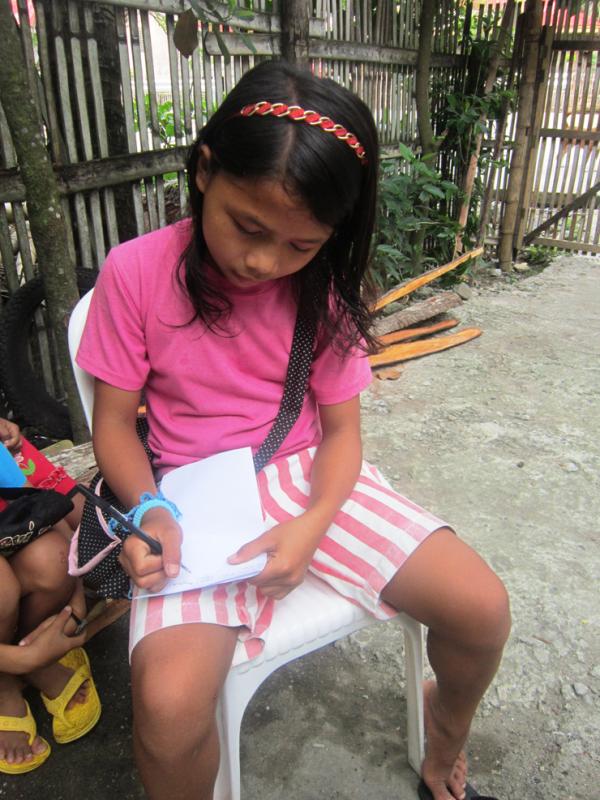
Chona wants to be a teacher someday.
Chona at her young age understands that her family is struggling to make ends meet. Her father works as a farmer while her mother is a laundry woman. Chona helps on the farm and in the house the best she can. While other children of her age are holding dolls, Chona is holding a trowel. While others are having summer fun at the beach, she is planting crops under the heat of the sun. In the wet season they plant corn and in the dry season they plant rice.
Chona’s siblings were listening intently to the interview. Though they didn’t say anything, their eyes, hands, skin and feet spoke of the same story.
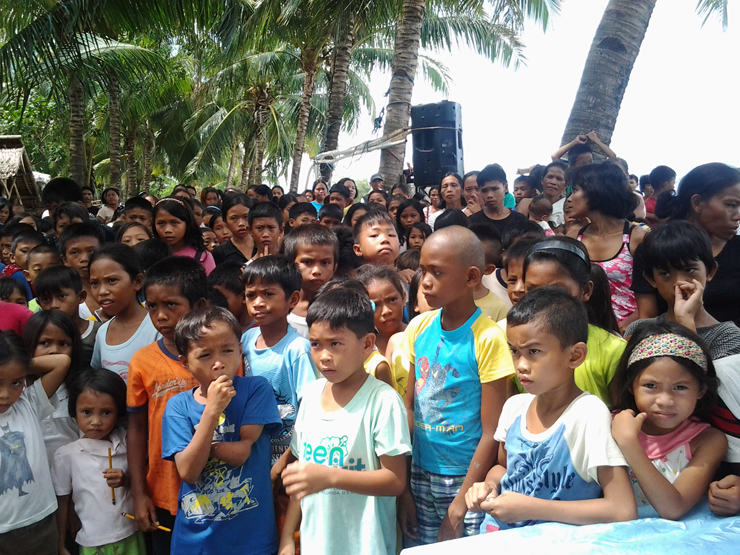
Chona is the one in pink shirt and pink headband, patiently waiting among the crowd of children who share the same hope of a brighter future.
While sipping my morning coffee, I decided to engage in an informal chat with Tatay Hermenio. I thanked him for accompanying his children. Though I didn’t put any question to him he started sharing something that almost made me break into tears. He said he regretted not being able to learn how to read and write. He would only place his thumb mark when he needed to sign documents. His own life is a testimony to how difficult life is when one is illiterate. When his children started reading and writing, he couldn’t explain how happy he was. He wants them to have a bright future-- a life beyond what the plantations can offer, a life different from what he has endured.
Despite his lack of education, Tatay Hermenio did something very remarkable in his community. The children had to endure a difficult journey to school having to ford the river and pass through muddy and slippery trails. This was something that he thought could be solved by a hanging bridge. It would make things easier for the students, especially his own children, to reach school. He spoke to the community leaders and discussed the need for such a bridge - one was then constructed.
Tatay Hermenio ever fails to teach his children the value of caring for each other. I observed this in his daughter Chona. When they were invited to the breakfast table, she made sure her younger siblings finished eating first. She has developed the habit of caring for them and prioritizing them at every meal. Unlike other children whom we had difficulty in asking about their dreams, Chona clearly knows what she wants to be. She said that her father would always remind them to dream big. Chona dreams of becoming a teacher someday. This dream was planted in her heart not just for her own self. It is a dream that she has for other children as well, so that they will persevere in their studies and then discover their dreams too.
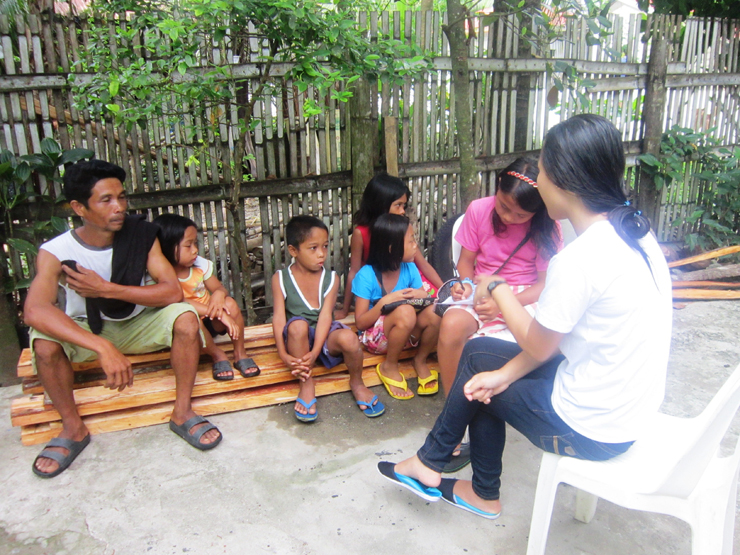
>Irene, a Kwaderno core group member, interviews Mang
Hermenio and his children.
My own parents did not finish their education and this contributed to our poverty. Hence, at a young age, I promised myself that I would strive hard so that I could finish college. Education for me is something personal and so I am taking it as one of my life advocacies. I believe that everyone should be given access to it and that the children should be properly guided and ushered to reach their dreams. Tatay Hemenio inspired and affirmed me greatly that day as we distributed notebooks to the rest of the children in Barangay Sanke. I never thought that our simple activity would reveal to me something beautiful about the importance of a father’s love and heroism. Tatay Hermenio’s dedication to his children is what makes them believe there is a brighter future waiting to be seized.
You may email Richelle at editorialassistant@misyononline.com ;
Keeping Father Niall’s legacy alive: After 10 years, now and beyond
By Richelle Verdeprado
The author is Editorial Assistant of MisyonWe are not immortal beings. In as much as we would want to do amazing things unceasingly and never leave the people that we love, we cannot live forever. Perhaps this is how it really goes in our human lives. We will have years of celebrating our birthdays until one day others will be starting to commemorate our death anniversaries instead. While still breathing we can have moments of learning, enjoyment and discovering until one day we can no longer do them again.

Fr Niall O’Brien.
But I think too, it is that same mortality that can make our lives even more precious. It is that same mortality that will give us enough time to bring joy and hope, to make choices and changes that can go beyond our own lives and have an impact on one individual or even on the entire community and the world. Likewise, it is that same mortality that can cause some people meet each other while others never get that chance. There is a time element in life.
The Kibbutz on Tall Grass Mountain, which shows one of the major initiatives of Fr Niall O'Brien, was produced by the Columbans in the USA in the 1970s, during Martial Law in the Philippines.
Yet for people like the late Columban priest Fr Niall O’Brien, life is longer than the years spent on Earth. And though we commemorated his tenth death anniversary on 27 April this year his spirit is considered not only a part of history but also part of the present and the future. What he has left is not only memories, but inspiration, vision and legacies.
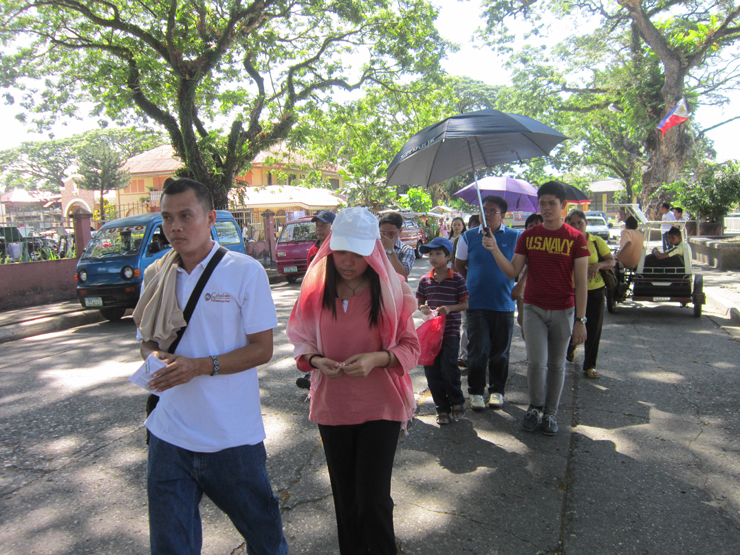
Procession
to Catholic Cemetery, Kabankalan City, Negros Occidental.
As we travelled from Bacolod City to Kabankalan City in the southern part of Negros Occidental, my thoughts travelled as well. I know Father Niall only in print, in pictures, in words and in stories. I know a few things about him -- of him being the former editor of Misyon where I am now working and as one of the Negros Nine who, despite being falsely accused, never lost hope in the goodness of people and in the prevalence of justice no matter what. I have come to know him by the way people who had been part of his life would say so many great things about him and how they express their sadness upon his passing away. I have seen how they have been missing him and I can only get more curious but at the same envious because I missed the opportunity to encounter him in person. I will never be able to write about how he spoke, or how he would smile, or give advice, or bring hope to others. I will never know how it felt to walk or work with him or to listen to his homilies.
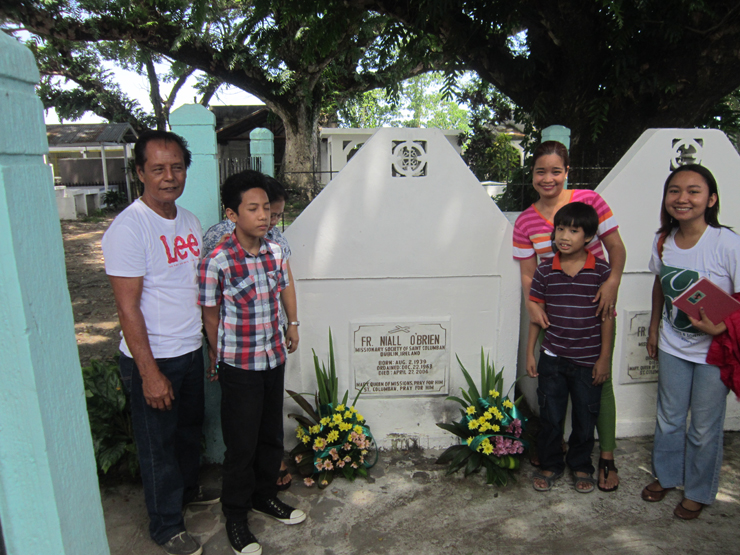
At the grave of Father Niall.
Thus it was a blessing to be part of his Tenth Anniversary not just on the pilgrimage to his tomb in Kabankalan Catholic Cemetery and at the Mass at Espinos Chapel in Bacolod City but also in sharing and in informal conversations about him. I think that the essence of the pilgrimage wasn’t just for those who had met and known him, but also for people like me who wanted to know him and be touched by his life too. We were joined by the people of Kabankalan City, friends of Father Niall and Columban missionaries, priests and seminarians.
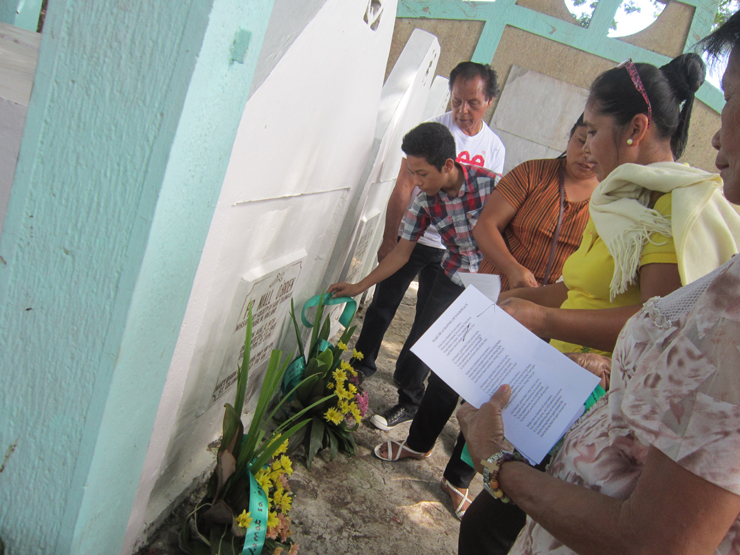
Praying at the grave of Father Niall.
I was also deeply moved when the teary-eyed Judith Alimpulos recalled in front of Father Niall’s tomb how he related to her family, especially to her late husband whom he would usually hire to fix his car. Father Niall treated his employees as friends and as family. He was always willing to extend a helping hand, to talk to them and to learn their dreams and passion and support them in any way he could.
In that same pilgrimage, Rosanna Aguilar of Kabankalan City, now 47 years old, recalled how Father Niall would joyfully lead the young people in community singing. She was only 12 years old that time, but she had experienced how he would treat equally people from all walks of life equally. She had seen how he would deal with farmers, fisher folk, community leaders and the youth with the same kind of respect and care.
Bishop Gerardo Alminaza of the Diocese of San Carlos that includes part of Negros Occidental and part of Negros Oriental, spoke in his homily of how Father Niall had been promoting peace building based on justice in his own life. Bishop Alminaza said that as the celebration also coincided with Divine Mercy Sunday, it was good to see the works of Father Niall as expressions of Divine Mercy. The celebration which had the theme ‘Keeping Father Niall’s legacy alive: After 10 years, now and beyond’, was highlighted by a look back at Fr Niall’s contribution to liturgical renewal, lay formation and active participation through the Sa Maria Movement and the Kristianong Katilingban.

Friends of Fr Niall at his grave.
Death is a reality in life, even part of it. But it is this same temporary life that can reveal to us what really matters most--- those that will last and surpass death, like being at peace, promoting justice, and having a heart that will love people unconditionally and infinitely. The books he wrote, the testimonies of the people he met, the inspiration he is giving to people like me who have only heard things about him and the good works he started that continue to flourish have immortalized Father Niall. Because he has been immortalized, I have come to know him now and have been profoundly inspired by him.
You may email Richelle at editorialassistant@misyononline.com
Learning 'Poco a Poco' in Honduras
Learning 'Poco a Poco' in Honduras

By Mary Ann Ofialda
The author, from Iloilo City, is working as a lay missionary in Honduras with the PME Fathers. She worked as a Columban Lay Missionary from August 2003 to April 2006 in Taiwan. In July 2012 she was assigned to Tegucigalpa, the capital of Honduras. Currently, she is working as a volunteer at a home for the aged, Hogar de Ancianos Maria Eugenia, and in Casa Ángeles, a home for abandoned/orphaned children with severe physical and mental disabilities, and the mission animation project, Ad Gentes. Mary Ann worked in Taiwan as a Columban Lay Missionary from August 2003 to April 2006.

The author, center, with children in Honduras.
‘One doesn't discover new lands without consenting to lose sight, for a very long time, of the shore.’– André Gide.
In 2011, when I was accepted into the second level formation in Davao del Sur of the Société des Missions-Étrangères or the Foreign Mission Society of Quebec, known in the Philippines as the PME Fathers, I felt that I had taken a very significant step, venturing out to a unique kind of calling. It was a decision that took a lot of personal discernment, reflection, gradual detachment from my comfort zones as well as support and counsel from my family and close friends. My four months' experience during formation among the B’laan people in the mountains of Little Baguio, Davao del Sur, was a memorable story in itself.
The final formation in Centre International De Formation Missionnaire (CIFM) in Montreal, Quebec, continued the process of purifying my motivation. More and more the call to choose the life of a lay missionary associated with the PME Fathers had grown deeper. In every step of the way, I realized that to discern your vocation your life needs to be consistently re-examined and re-read. That is a never-ending process.
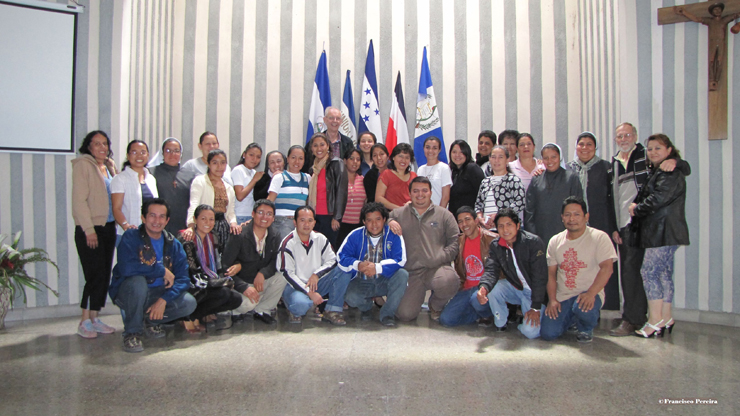
The author, second from left, standing, with other PME
lay missionaries.
During formation and discernment I also had to prepare myself for the next stage, being assigned for my first term of mission in a new country. I included my preference for any of the Spanish-speaking countries in Latin America when I wrote my application letter to the Central Council. Lay missionary candidates are allowed to name their country of preference but the Central Council of the Society makes the decision about the country of assignment.
When I received the news of my assignment to Honduras, Central America, I was pleased that my request had been granted. My first term contract was for four years. I did some research on Honduras on the internet but seemed to find more negative than positive reports about it. So as not to dampen my enthusiasm I stopped reading this discouraging information but somehow, I also couldn’t help but feel apprehensive, wondering what kind of life would be waiting for me there. I truly appreciated it when some of the retired Fathers in our central house would share their mission stories. Those who had lived in Honduras for many years recounted encouraging stories about their experience there.
I also took great comfort from my favourite Bible passages that over the years have never failed to offer refuge and strength on my missionary journey, especially Psalms 91 and 139.With these in my heart, I just had to trust in God’s providence, that He would take care of me in Honduras. After the mission-sending Mass and the signing of the contract, I had to say my goodbyes to some wonderful people I had met and befriended in Canada and was mentally and spiritually preparing myself for the journey ahead. I had mixed feelings of anxiety and wonder, anxiety at venturing out again into a new environment but wonder too at what lay ahead for me.
The night I arrived I got a general view of Tegucigalpa, the capital, from way up in the sky. Looking down at all the lights surrounding the city, it seemed to me at that time very mysterious and secretive. I received a warm welcome at the airport from priests and some of the lay missionaries. I temporarily stayed with the mission team in an area called Pantanal and they helped me get acquainted with the place, the food and the transportation, among other basic things. I got to meet the other members of the SME community in Honduras at our gatherings every Monday at the central house in the parish of Our Lady of Guadalupe. The SME Fathers are known here as ‘Padres Javerianos’ because of the Society’s patron, St Francis Xavier. It was also a gradual introduction for me to the different ways people were speaking Spanish. I was quite happy that some basic words are the same as in the Philippines, like cuchara, cuchillo, cubiertos, plato, la mesa, etc. Well, my happiness ended there and simple things got more complicated as I started studying Spanish.
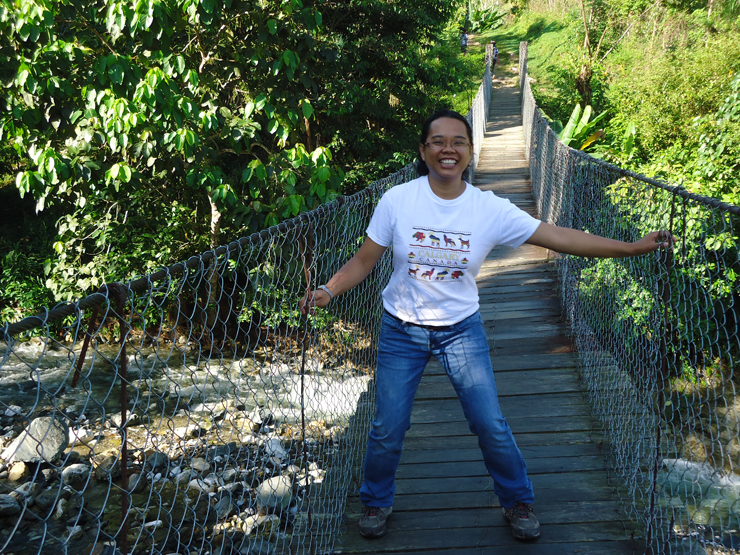
The author.
My first integration in Honduras was to learn the language. Over the course of four months, I studied in a pleasant and secure place forty-five minutes away from the city called Valle de Ángeles, aptly translated as ‘Valley of the Angels’, in a school founded by a retired SME priest. As part of the language program, students have to stay with a family for the duration of their studies. I had the experience of living with two Honduran families from very different backgrounds and status in life. Both were very helpful in acquainting me with Spanish and practicing it.
In between language study I slowly familiarized myself with the different SME mission teams. As part of integration in the communities, small ‘insertion’ groups are formed with three or more members – women and men lay missionaries and priests coming from different cultural backgrounds – living together and belonging to the same mission team. Aside from the team in Pantanal, there is the team in Cerro Grande that focuses more on mission animation.
I currently belong to the team in Pantanal with a Canadian SME priest and a lay missionary from Colombia. After I finished studying Spanish I started to collaborate with the mission animation project and helping a team of volunteers at the diocesan level of formation. On the first Saturday of each month, a series of one-day sessions is held with persons who are willing and interested in going deeper as they discern about being lay missionaries Ad Gentes, ‘To the Nations’.
Another thing I am also in the stage of familiarizing myself with and helping out a little is the apostolate for children, Pastoral de la Niñez. The main recipients are mostly mothers and their young children. Various activities are planned every year by the leaders themselves. I help with the children’s tutorial class every Sunday morning in one of the interior colonias (zones). Poverty is very evident in all of Honduras and in Pantanal it is particularly apparent. The colonias are heavily populated, with limited access to basic necessities and sanitation. Scarcity is a way of life and most people are unemployed. These scenarios create many problems such as crimes and violence, generally drug-related. Gangs control the ever growing drug trade. This establishes an atmosphere of insecurity, distrust, and fear within the community. It is lamentable that the children in these colonias grow up in this kind of atmosphere.
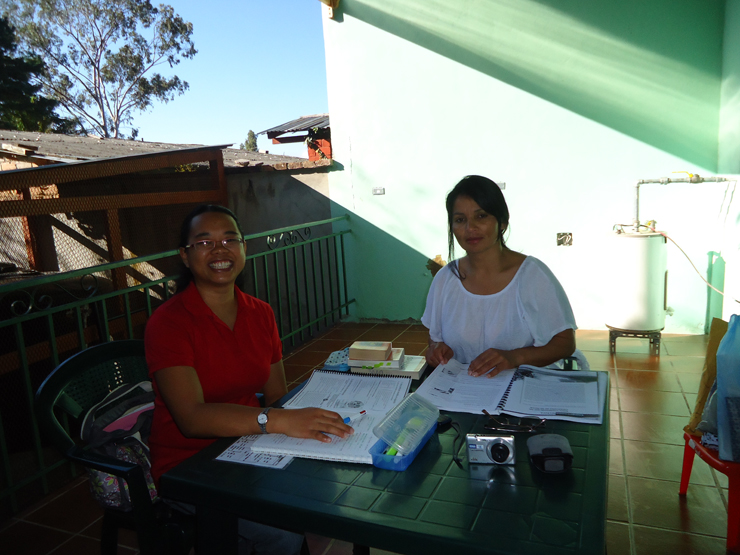
Preparing the next activity.
In rural villages, like in Valle de Ángeles, I still see a measure of hope. During Holy Week I experienced another face of Honduras that is totally in contrast to the dismal situation in urban areas. For a week in a rural village called Jalisco we were received with genuine hospitality, friendship and such positive community spirit. The families took turns in preparing our meals and offered us coffee and biscuits when we visited. The celebration of the Word was well-attended and participated in. They may be ordinary people living very simple lives but their spirituality is richly manifested through their kindness and generosity to strangers like us. There are other reasons to be optimistic such as the zeal of the young people. One thing very evident here is churches filled with young children, teens, all kinds of people from different walks of life breathing in freshness and dynamism at celebrations of Mass.
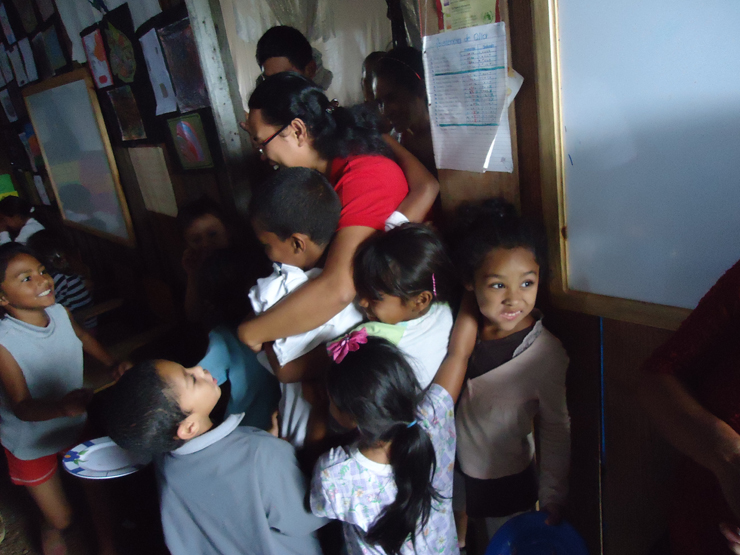
Mary Ann with children.
Nearly two years have passed since I arrived in Honduras. As people say to me in Spanish, everything is learned ‘poco a poco’ – little by little! I really believe this to be true especially when at times I feel out of my depth trying to adapt to the new environment, discovering new ways of living in a multi-cultural group, trying to get comfortable when speaking a new language, but also, recognizing and appreciating that sense of belonging as a new member.
I am under no illusions that this is a path that is easy to take, with its various challenges and uncertainties. But it has brought richness to my life through sharing and dialogue with various individuals and groups I have met along the way. I am really grateful that He has carried me this far.
Lastly, I pray that the presence of each missionary in mission areas all over the world may constantly be a source of blessing and a testimony of hope to others, since we are all pilgrims on the same path with God as our ultimate destination.
You may email the author at anjiao_2577@yahoo.com

Honduras
Honduras has a land area of 112,492 square kilometers, slightly larger than that of Luzon (109,985 sq kms). It has a population of more than 8 million, compared to Luzon’s of approximately 48 million (both 2010 estimates). As in the Philippines, about 80 percent are Catholics. The Catholic Church has one archdiocese and eight dioceses.

Oscar Andrés Cardinal Rodríguez Maradiaga SDB, Archbishop of Tegucigalpa
Metropolitan Cathedral of St Michael the Archangel, Tegucigalpa

Tegucigalpa

National Flag of Honduras
National Anthem in Honduran Sign Language

Map of Honduras

Ara Macao, Scarlet Macaw, National Bird of Honduras
Photos from Wikipedia.
Opening of First Contemplative Monastery in China since 1949
The following press release was published in May and has been slightly edited. Columban Fr Eamonn O’Brien, Director of Cultural Exchange with China (CEC) is from Ireland and spent his early years as a priest in the Philippines.
On 1 May the feast of St Joseph the Worker, the monastery of St Augustine was opened in Lintou, in the Shan Xi Province of China. This is the first contemplative monastery to be opened in China since1949.The monastery and associated nursing home will be known as St Augustine's Garden.

St Augustine's Garden was opened by Bishop Paul Meng (Diocese of Taiyuan). The opening Mass was concelebrated by Bishop Wu Jin Wei (Diocese of Yun Cheng) and approximately 50 priests, with over 1,700 Catholic lay faithful in attendance. The two-hour Chinese Mass was full of joy and thanksgiving. The monastery chapel was opened and consecrated by Bishop Wu Jin Wei the previous evening.

Bishop John Baptist Wang Jin, Diocese of Yutze (seated)
with Sr Mary Niu Shufen and her father, the architect of the new monastery.
The Mother Foundress of the monastery, Sr Mary Niu Shufen, commented that the monastery is ‘Not my work but God's work as He looks after both the small and big work’. The celebrations included an open air Mass with four bands providing musical accompaniment to the liturgical celebration. At least eight dioceses were represented at the opening of the monastery. Both the local county's Head of the Government Religious Affairs Bureau and the Secretary of the Communist Party in the local village attended the Mass and gave speeches of support during the reception.
|
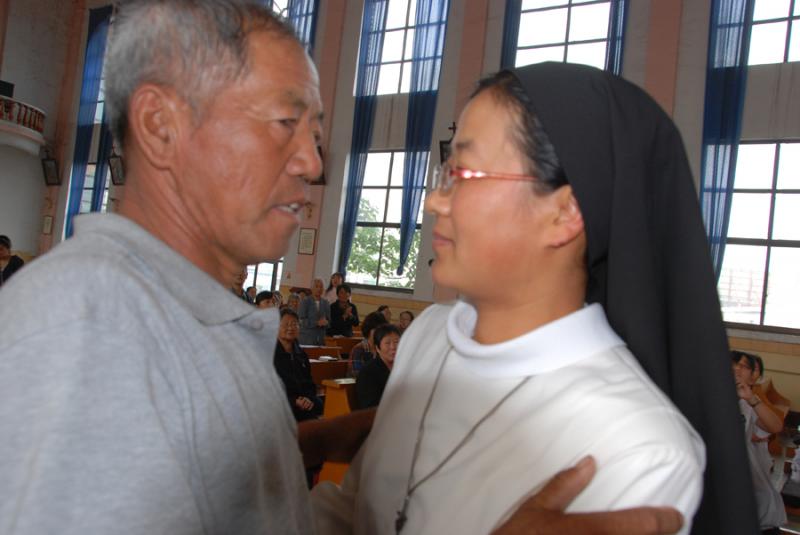
Newly professed Sister Shi with her father from Inner Mongolia, China.
The World Day of Prayer for China occurred on Saturday 24 May. Please hold the work of St Augustine's Garden and CEC in your prayers; as the Director of CEC commented at the opening of the monastery, ‘Let us ask God to give his love to the future of the project and bless it with many vocations’.
In 2007 Pope Benedict XVI dedicated the Feast of Our Lady Help of Christians, 24 May, as a day of prayer for Chinese Catholics. That date is associated with Our Lady of Sheshan venerated at the Basilica of Our Lady Help of Christian, Shanghai.

Our Lady of Sheshan
‘Chinese Catholics in the Diocese of Brooklyn, New York
City, celebrate Our Lady of Sheshan.’
Devotion to Our Lady Help of Christians was promoted by St John Bosco. Under that title Mary our Mother is the Patron of Australia. The Spanish title is Nuestra Señora María Auxiliadora and that in Tagalog is Maria, Mapag-ampon sa mga Kristiyano.
The situation of the Church in China is complex, as this video shows.
PRAYER OF HIS HOLINESS BENEDICT XVI
TO OUR LADY OF SHESHAN
ON THE OCCASION OF THE WORLD DAY OF PRAYER
FOR THE CHURCH IN CHINA (24 MAY 2008)
Virgin Most Holy, Mother of the Incarnate Word and our Mother,
venerated in the Shrine of Sheshan under the title "Help of Christians",
the entire Church in China looks to you with devout affection.
We come before you today to implore your protection.
Look upon the People of God and, with a mother’s care, guide them
along the paths of truth and love, so that they may always be
a leaven of harmonious coexistence among all citizens.
When you obediently said ‘yes’ in the house of Nazareth,
you allowed God’s eternal Son to take flesh in your virginal womb
and thus to begin in history the work of our redemption.
You willingly and generously cooperated in that work,
allowing the sword of pain to pierce your soul,
until the supreme hour of the Cross, when you kept watch on Calvary,
standing beside your Son, who died that we might live.
From that moment, you became, in a new way,
the Mother of all those who receive your Son Jesus in faith
and choose to follow in his footsteps by taking up his Cross.
Mother of hope, in the darkness of Holy Saturday you journeyed
with unfailing trust towards the dawn of Easter.
Grant that your children may discern at all times,
even those that are darkest, the signs of God’s loving presence.
Our Lady of Sheshan, sustain all those in China,
who, amid their daily trials, continue to believe, to hope, to love.
May they never be afraid to speak of Jesus to the world,
and of the world to Jesus.
In the statue overlooking the Shrine you lift your Son on high,
offering him to the world with open arms in a gesture of love.
Help Catholics always to be credible witnesses to this love,
ever clinging to the rock of Peter on which the Church is built.
Mother of China and all Asia, pray for us, now and for ever. Amen!
What Comes After Dusk
By Anne Gubuan
The author, assistant editor of Misyon, writes about Kwaderno, a project that the editorial staff of the magazine and friends of theirs initiated to buy school notebooks for children in impoverished areas. ‘Kwaderno’ is a Filipinized form of ‘cuaderno’, a Spanish word for ‘notebook’. The project was inspired to some degree by the involvement of some of the group with a school that was devastated last November by Super-typhoon Haiyan/Yolanda. You can read more about that in Misyon in the May-June issue, In the Midst of a Storm.
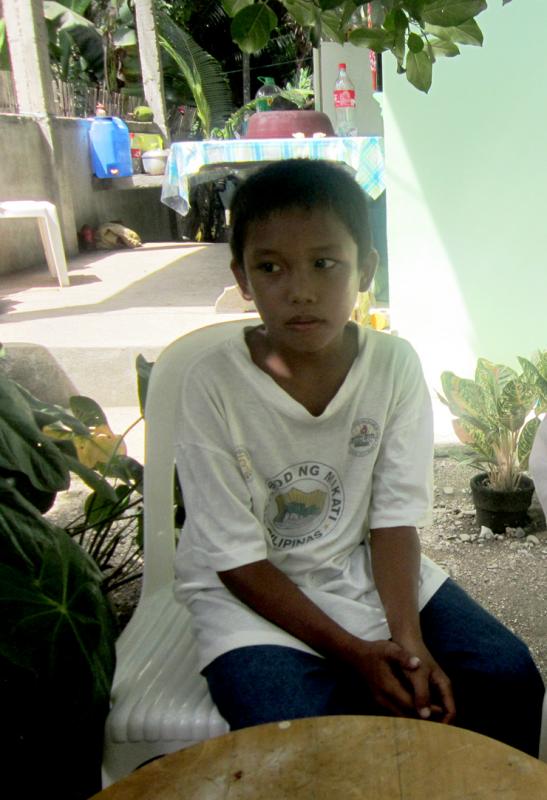
Marvin in pensive mood.
Marvin is 11 years old, but looks like he is only eight. His hands are riddled with bruises and marks which tell of his long days under the heat of the sun, toiling on the farm. He was wearing an old, almost worn-out, shirt and oversized pants that nearly reached his ankles. As soon as I asked him my first question, he hung his head and tears fell on his knotted fingers. It wasn’t easy to go ahead with my carefully lined up questions. They got all jumbled up inside my head, as I struggled not to cry with this little man, who needed all the encouragement he could get. Yes, ‘little man’, for all the burdens that his small frame carries, for the heart he has, brave and courageous amidst all the hardships, pains and uncertainties in life that he has to face each day.
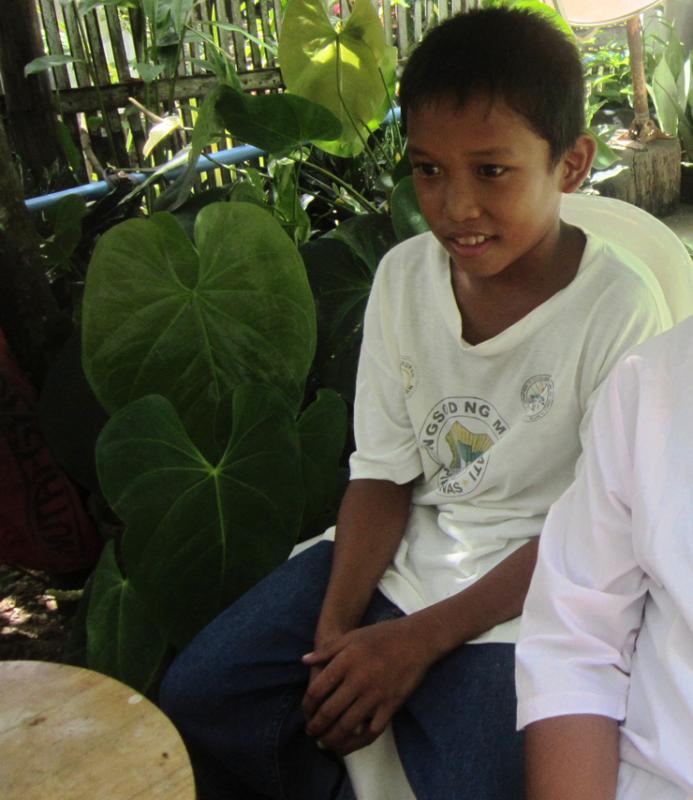
Marvin in hopeful mood.
‘Where do you live?’ I asked, careful not to intimidate him. ‘I live with my grandfather’, he answered meekly, still looking down, trying to stifle his tears. ‘You don’t live with your parents?’ I inquired. ‘My mother left me with my grandfather after she gave birth to me and she ran away with a man. I never saw or got to know her’. For a moment I was lost for words, feeling all the anguish his tears meant. His father also left to live with another woman and Marvin never got to know him either. His two older siblings live in other towns.
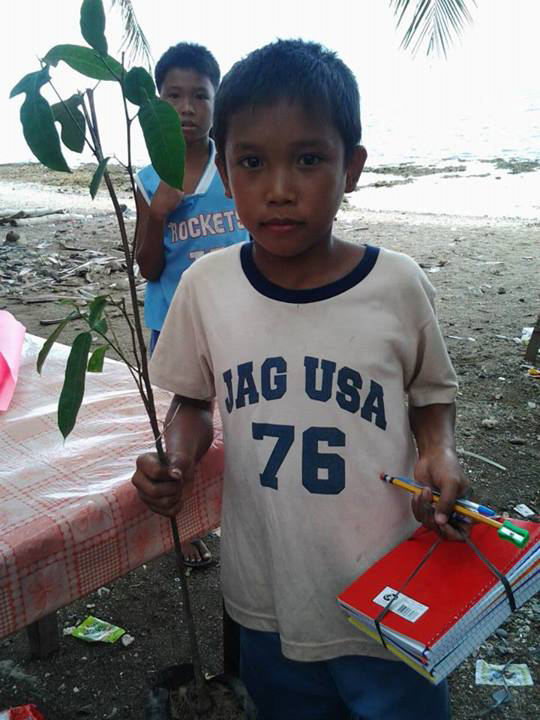
Marvin with his notebooks and a seedling to be planted
in their backyard. Part of Kwaderno's advocacy is teaching the children how to
care of Mother Earth.
He hasn’t been to any place outside Barangay Sanke. ‘How would you like the idea of going to see Bacolod City?’ I asked him, hoping to see some sunrise in his eyes that tell mostly of the dusk that mirrors what his future looks like to him. He shrugged and said, ‘It depends on whether my grandfather will let me’. My heart sank. The tone of resignation in his voice tugged at my heart. How can this little man give up dreaming when he is still a child? He has a million possibilities.
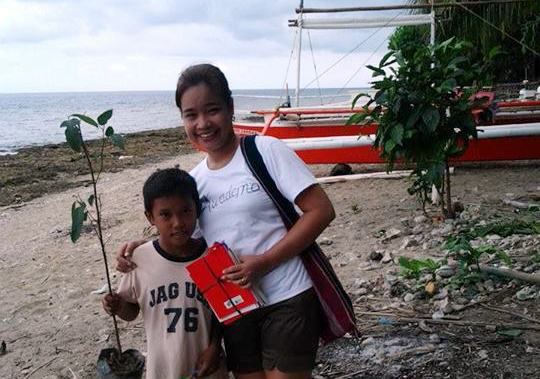
"It was truly a privilege getting to know Marvin."
I asked him what he wanted to be when he grows up and he answered, ‘I want to find a job with a high salary’. His dreams aren’t clear to him. He doesn’t know exactly what he wants to be, what course to take. The only thing in his mind is to be able to work and get paid well. He said his favorite subject was Mathematics. In my attempt to lighten his mood I quipped, ‘You could be an engineer!’ That brought a weak smile to his handsome face and he nodded shyly as if considering what I had just said.
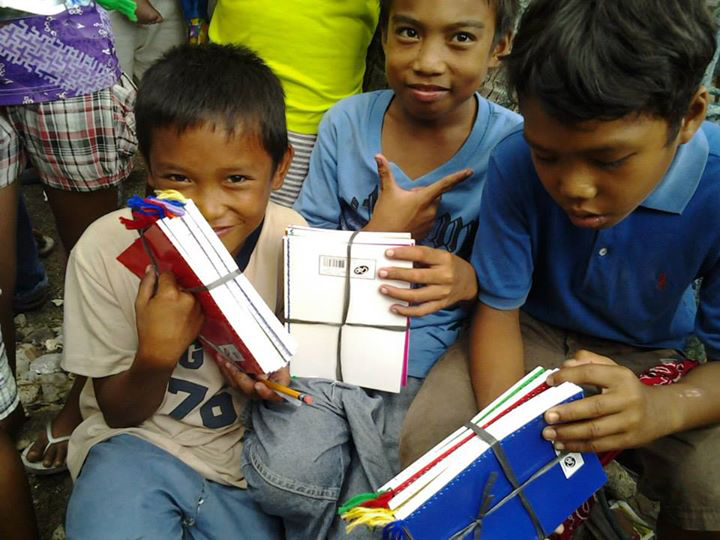
Marvin's smile was very noticeable the following day
after the interview.
Kwaderno is about bringing hope to children who do not know that dreaming is the first step to a life they rightfully deserve. Marvin is one of the recipients of the 4,504 notebooks we bought, having successfully raised enough money in only two weeks. How the donors flocked, more than eager, and so happy to be able to share is something that still leaves me lost for words. ‘Only God can do that,’ I keep saying. ‘Only love can do that.'
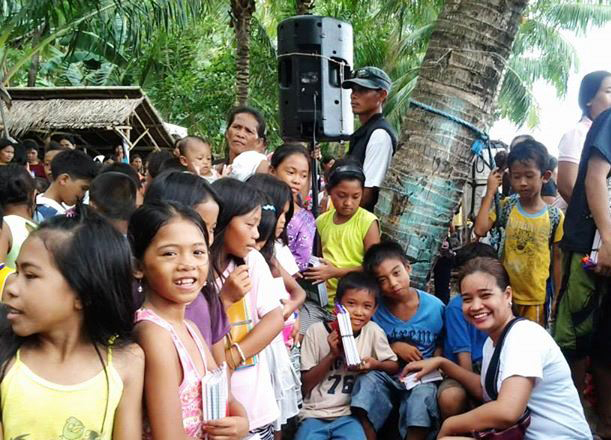
The author, right with some of the children and
parents.
My own childhood wasn’t an easy one. I had to go to school with hand-me-down uniforms if there were any, and worn-out sandals that had holes in their soles. I would bring candies to sell to my classmates during recess so that I could buy some snacks with my little earnings. But I am blessed with parents who took care of me and my four siblings, discussing with us our dreams and what we wanted to be when we would be older, and telling us that we had what it took to reach them. In spite of our poverty it was clear to us that each dawn offered great possibilities. I believe God let me grow up with this kind of love and affirmation from my parents so that today I can be there for Marvin and the rest of the children that our group is now committed to share our lives with.
You may email Anne at assistanteditor@misyononline.comWhere is Home?
By Beth Sabado
The author, from Pagadian City, Zamboanga del Sur, Philippines, is a nurse by profession and has worked as a Columban Lay Missionary in Taiwan. She is currently based in Hong Kong as Coordinator of the Lay Missionary Central Leadership Team (LMCLT).

The Sabado Family home, Pagadian City, Zamboanga del
Sur.
I had the chance to watch a stage play in Birmingham Repertory Theatre entitled ‘Refugee Boy’. A story about a fourteen-year-old boy born of an Ethiopian father and Eritrean mother and because of a violent civil war back home his father made a heartbreaking decision to leave him in London. The boy woke up one morning and his father was gone. As described, ‘Refugee Boy’ is a story about arriving, belonging and finding a home.
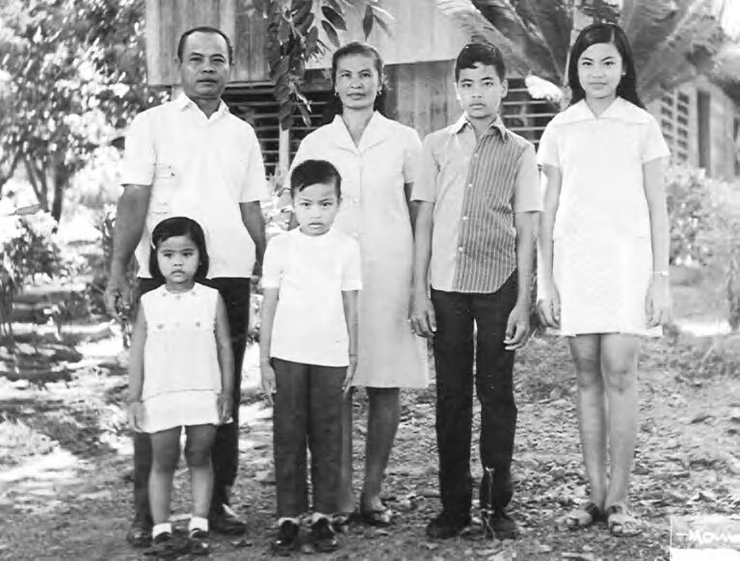
Back: Telesforo, Pacita, Felix and Gondee. Front: Beth
and Patboone (died 1981).
‘A home is a place where I can unpack my luggage down to the very bottom’. This is how one of the refugees in the play defined a home. Her definition stayed with me from then on.
When Dad passed away on March of 2008 I remember consoling myself with the thought that Mum was still around. However on one gloomy afternoon of February 2013, I received that dreaded phone call from my brother telling me, ‘Beth, Mum is hooked up on ECG but the traces are a flat line’. After a few minutes, with the convenience of modern technology, I was connected to my sister in the USA and my brother in the Philippines at Mum’s bedside praying the prayer of commendation online! Virtual and posh, I thought, but Mum passed into eternal life with God in whom she believed passionately and wholeheartedly.

Beth, left, with her sister Gondee, brother Felix and
their mother, Pacita.
I was on a flight the following day and when the pilot announced that we were on our final approach, all of a sudden this question dawned on me: ‘Where is home for me now?’I felt a vacuum of loneliness deep within me. It was so daunting. The thought of going home to an empty house the next time I traveled home was mentally debilitating. For more than a year I kept asking myself the same question: ‘Where is home now?’
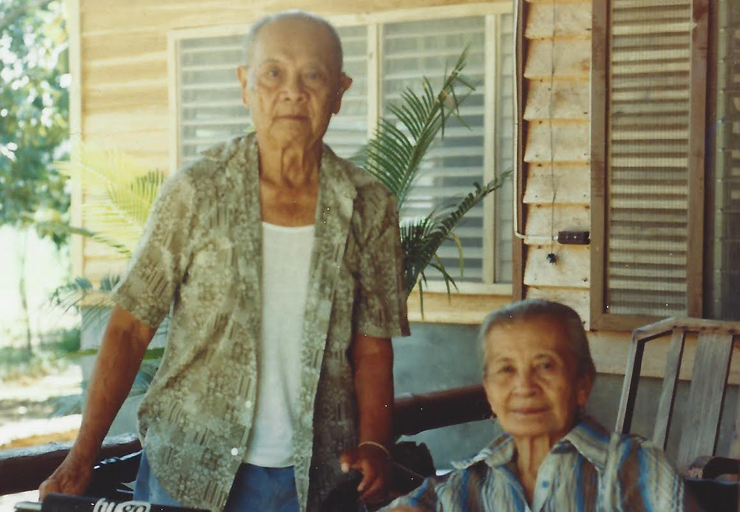
Beth's parents in old age.
Losing both parents is the same as losing the center of your home. This loss will somehow redefine that space: that space that used to give comfort, that space where you felt loved, that home where no amount of concealment can ever bring back its original form. I had the chance to return to my parents’ house a year after Mum passed away and the emptiness and deafening silence confirmed that big change. Opening the refrigerator gave me a sense that it no longer belonged to the same family, that it was no longer the family refrigerator!
I lived out of a suitcase during the first quarter of 2014.Over a period of three months I visited six countries and the demands of traveling took their toll on my health. While on the last leg of my travel, I felt my energy level draining. I managed to return to base in one piece and standing but then I was in bed for almost two weeks. I realized that as I grow in age my body demands a longer time to recover from my travels. When I was younger, taking a long-haul flight and reporting back to work on the same day was a common thing. I believe the time has come for me to ‘Take kindly the counsel of the years, gracefully surrendering the things of youth’(a line from Desiderata). With those days I spent on bed, I had the time to ponder on my own new definition of home. Just like in the play, home as a place where I can unpack my luggage down to the very bottom. However there is more to that.
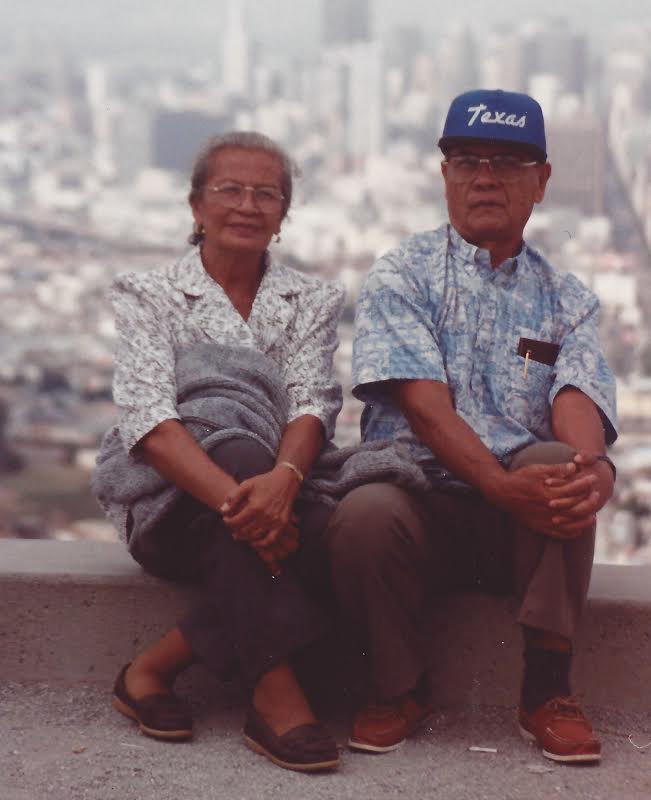
Beth's parents.
Meeting people for the first time and feeling the connection and trust, catching up with friends, family and relatives, visiting colleagues, exploring new places, sharing a meal, a moment of laughter, a time to rest, receiving a phone call from a long-lost friend, receiving a smile from a stranger, listening to the sounds of nature, sitting on a favorite chair while reading a book and sipping a cup of coffee, finishing a task, a time for prayer: these are spaces where I feel moments of grace. That space that gives joy, warmth and comfort, is a space of home right at that very moment. The presence of God becomes more tangible in every single act of ‘unpacking’. Indeed this is my new perspective of home, a space where I live deep within. I am home.
You may email the author at clmcltcoordinator@gmail.com or at madamsaturday.ms@gmail.com
Father Joeker
Ang Medalyon
Noong nasa Germany ako, pumunta ako sa isang department store. Tinanong ko ang sales lady kung ano ang pwede kong mabili sa 50 pfennigs ko -– hindi ko kasi kabisado ang halaga ng pfennigs sa peso. Sinamahan niya ako sa jewelry section. Laking tuwa ko kasi mukhang makakabili ako ng isang mamahaling kwintas. Pero isang pagkaliit-liit na medalyon ang inabot niya sa akin. Asus, bigla akong namula sa hiya. Di ba

I Love You
Our hosts at Oies, northern Italy, treated us at Kapalla Restaurant. Inside the restaurant was a very big card with ‘Ich liebe dich’ written on it. I asked my companion, Fr Ittoop, what it meant. He said that I should say it to the waitress when she came. So, I said aloud to her, ‘Ich liebe dich’. She blushed and after a few seconds said, ‘Bravo, bravo’. The other customers broke into laughter. One of them who spoke German translated it for me: I love you. Luckily the lady did not say, ‘Avante’.

Bagong Mata
Pumunta ako sa Methodist Eye Clinic para magpatingin. Nagulat ang doctor nung nakita niya ang aking salamin. ‘Ang salamin mo ay para sa taong sampung taon ang tanda sa iyo.’ Nang ikinuwento ko ito, sabi ng aking kaibigan, ‘Dalawa ang maaari mong gawin: magpalit ng salamin o magpalit ka na ng doctor.’ Magpalit na lang kaya ako ng mata, ano sa palagay n’yo?

Pretty in Pink
When I was at the outskirts of Wenchi town, my attention was drawn to a group of chicks marching after their mother hen. They were all painted pink! ‘Why are they painted like that?’ I curiously asked the man standing nearby. ‘So that the hawk will not catch them,’ he replied. Well, how about that? Native ingenuity at work!
Our Hideaway

Our Hideaway is a venue for the youth to express themselves and to share with our readers their mind, their heart and their soul.
Passion is the Key
by Stephen Virtudazo Tabal
The author teaches physics in Lanao del Norte National Comprehensive High School (LNNCHS), Baroy, Lanao del Norte.
‘Teaching is not a profession but a passion’, it has been said. I didn’t realize this until I was employed in a public high school. It is totally different from the schools where I used to teach. It seems like I’m in a parallel universe and I feel that I need a lot of adjustment to before I can teach well.
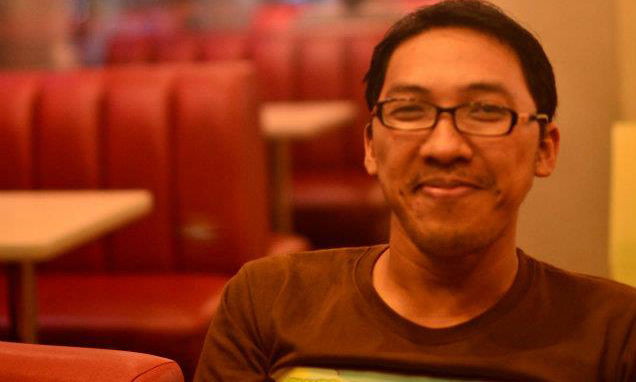
One day I assigned my students to bring candles for our optics activity in physics. Fortunately it went well and the students enjoyed it much. After the activity, a student named John (not his real name) approached me and said, ‘Sir, may I have the candles used in our activity?’ I paused for a while and asked, ‘Why?’ With head bowed down he answered, ‘I will use them to light our house so that I can work on my assignments’. I couldn’t believe what I had just heard. Up till then almost every person I met on the street had a smartphone and tablet. But there are still areas in our country left in the dark not because of blackouts but because of extreme poverty.
After a week the rainy season came and many of my students were absent. John came in five minutes late and wasn’t wearing his uniform so I approached him and he said, ‘Sorry, Sir. I had to remove my uniform because I was soaked but I can still put it back on. It’s in my bag. I wrapped it in cellophane.’

I was so amazed that he still managed to think of wearing the prescribed uniform rather than being concerned about his health and have no worries because, according to him, Jesus was with him in his long journey of about eight kilometers to school by foot.
Truly teaching is a passion but John made me realize what passion is all about. For him education is the key to uplifting his family financially and that he can rely not only on his own strength and intelligence but on God’s divine guidance and wisdom. John opened my eyes to see that passion is useless if teachers don’t have a life filled with love, joy and an acceptance like his of Jesus.
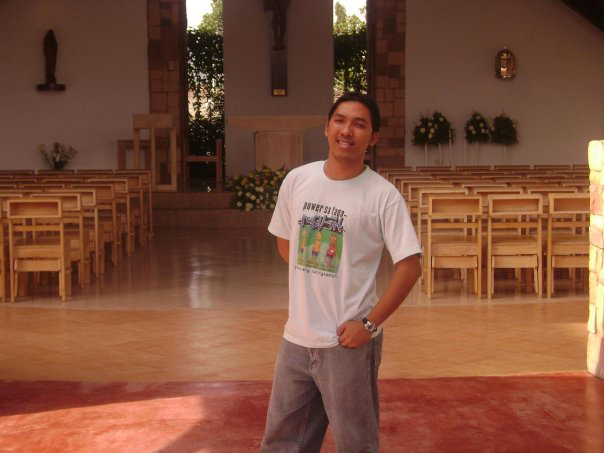
In the chapel of Father Saturnino Urios University,
Butuan City.
John is now in third year college in a prestigious university under a scholarship program and his passion still lives on. He may not know it, but he taught me many things which I intend to pass on to others.
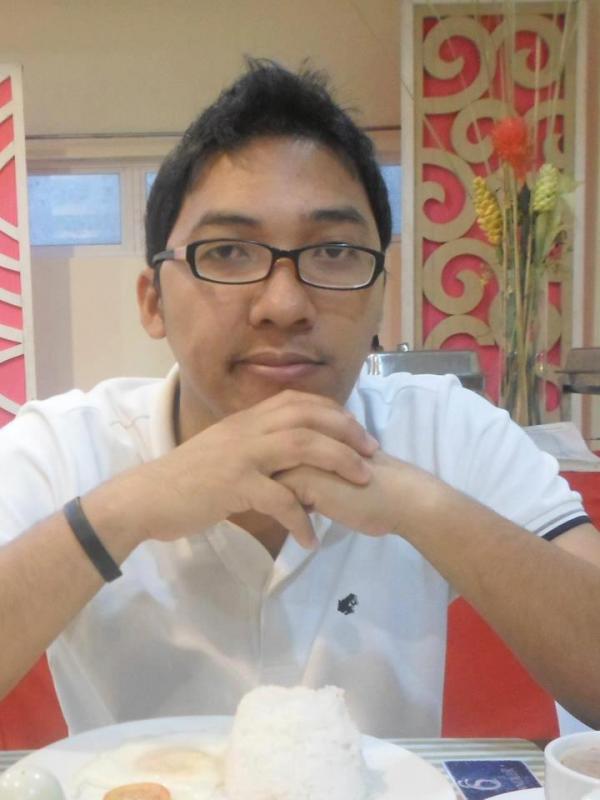
You may email the author at mr_phys12@yahoo.com
Peace by Peace

Not easily shall one reach this height; it is no child’s play, nor the work of a day to turn with a decisive gesture from the allurements of life. It costs blood to stand the strain and overcome the repugnance of nature. When we bend our minds to this prayer and say it earnestly, we seem to hate ourselves and in the eyes of worldly men to act foolishly and give an opening for the charge of folly. ‘Unto the Gentiles folly’, utter folly to neglect the passing joy, to allow the flower of the time to pass by us. Yet looking on Christ we shall willingly accept such opprobrium. So sure are we of the goodness of the heart of God that we can wish for nothing better nor plan for anything more secure than what his Divine Heart wills, for never is a man so utterly right, so sure of blessings, as when he says this prayer – ‘Our father . . .thy will be done . . .’ -Pathways to God, Fr John Henaghan, MSSC |
‘It is Jesus that you seek when you dream of happiness; He is waiting for you when nothing else you find satisfies you; He is the beauty to which you are so attracted; it is He who provoked you with that thirst for fullness that will not let you settle for compromise; it is He who urges you to shed the masks of a false life; it is He who reads in your heart your most genuine choices, the choices that others try to stifle. ‘It is Jesus who stirs in you the desire to do something great with your lives, the will to follow an ideal, the refusal to allow yourselves to be ground down by mediocrity, the courage to commit yourselves humbly and patiently to improving yourselves and society, making the world more human and more fraternal.’ ― St John Paul II |
The Beautiful Hands of a PriestWe need them in life's early morning, And when we are taking life's partner, -Author Unknown |
Pope Francis: Do you want to be a priest?Please choose the way of peace. ... In the short term there may be winners and losers in this war that we all dread. But that never can, nor never will justify the suffering, pain and loss of life your weapons will cause. Mother Teresa, -- Letter to U.S. President George Bush and Iraqi
President Saddam Hussein, January 1991. |
Blessed Mother Teresa on Prayer |
Pray for the Christians of Iraq
Fr Ragheed Ganni, a priest of the Chaldean Catholic Church, which is in full communion with Rome, spoke in Bari, Italy, about the Eucharist on Saturday 28 May 2005, the eve of a visit by Pope Benedict XVI to close a Eucharistic Congress there. This is what Father Ragheed said:
Mosul Christians are not theologians; some are even illiterate. And yet inside
of us for many generations one truth has become embedded: without the Sunday
Eucharist we cannot live. On June 2004 of last year, a group of young women were cleaning the church to get it ready for Sunday Mass. My sister Raghad, who is 19, was among them. As she was carrying a pale of water to wash the floor, two men drove up and threw a grenade that blew up just a few yards away from her. She was wounded but miraculously survived. And on that Sunday we still celebrated the Eucharist. My shaken parents were also there. For me and my community, my sister's wounds were a source of strength so that we, too, may bear our cross. Last August in St Paul Church, a car bomb exploded after the 6pm Mass. The blast killed two Christians and wounded many others. But that, too, was another miracle—the car was full of bombs but only one exploded. Had they all gone off together the dead would have been in the hundreds since 400 faithful had come on that day. People could not believe what had happened. The terrorists might think they can kill our bodies or our spirit by frightening us, but, on Sundays, churches are always full. They may try to take our life, but the Eucharist gives it back. On 7 December, the eve of the Immaculate Conception, a group of terrorists tried to destroy the Chaldean Bishop's Residence, which is near Our Lady of the Tigris Shrine, a place venerated by both Christians and Muslims. They placed explosives everywhere and a few minutes later blew the place up. This and fundamentalist violence against young Christians have forced many families to flee. Yet the Churches have remained open and people continue to go to Mass, even among the ruins. It is among such difficulties that we understand the real value of Sunday, the day when we meet the Risen Christ, the day of our unity and love, of our [mutual] support and help. There are days when I feel frail and full of fear. But when, holding the Eucharist, I say 'Behold the Lamb of God, Behold, who takes away the sin of the world', I feel His strength in me. When I hold the Host in my hands, it is really He who is holding me and all of us, challenging the terrorists and keeping us united in His boundless love In normal times, everything is taken for granted and we forget the greatest gift that is made to us. Ironically, it is thanks to terrorist violence that we have truly learnt that it is the Eucharist, the Christ who died and risen, that gives us life. And this allows us to resist and hope. Two years later, on 3 June 2007, Trinity Sunday, Father Ragheed was murdered after celebrating Mass in Mosul, along with three subdeacons, BasmanYousefDaud, Wahid Hanna Isho, and Gassan Isam Bidawed. FrGanni was secretary to PaulosFarajRahho, the Archbishop of Mosul of the Chaldean Church, Iraq's largest Christian community. On 29 February 2008 Archbishop Rahho was kidnapped. His body was found in a shallow grave on 13 March.
On Sunday, 20 July, for the first time in almost 2,000 years Mass was not
celebrated in Mosul, where Father Ragheed, who gave up his profession as an
engineer to become a priest, had served. Christians had been driven from their
homes by the Islamic State, formerly known as the Islamic State of Iraq and the
Levant (ISIL). |

